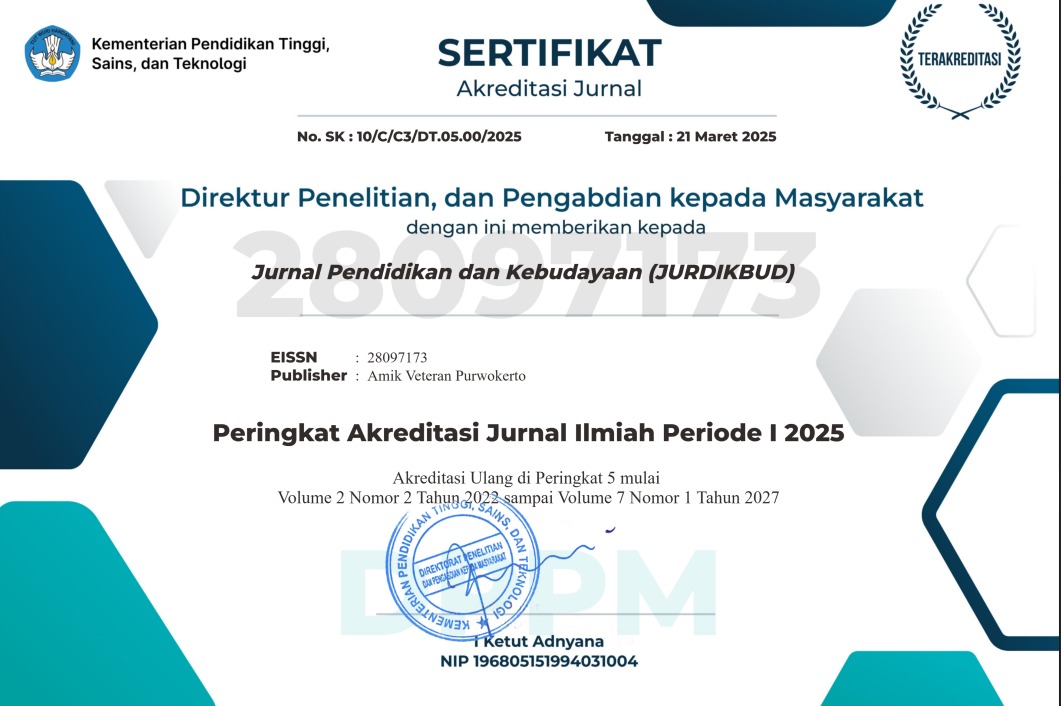EFEKTIVITAS E-LEARNING SEBAGAI MEDIA PEMBELAJARAN PADA MATA KULIAH BAHASA INGGRIS DI POLITEKNIK NEGERI JAKARTA
DOI:
https://doi.org/10.55606/jurdikbud.v2i3.690Keywords:
Covid-19 pandemic, Learning Media, E-learning.Abstract
The Covid-19 pandemic that hit Indonesia caused the temporary suspension of all learning activities. This requires higher education units to utilize science and technology effectively and efficiently. One of the learning media that can be used is e-learning. However, the application of online lectures through e-learning is a big question mark regarding the effectiveness of its use. The purpose of this study was to determine the effectiveness of using e-learning to improve English language skills in the era of the Covid 19 pandemic. This research is an experimental study conducted at the Jakarta State Polytechnic PSDKU Demak. The instrument used in this research is in the form of pre-test and post-test questions. Analysis of the data used in this study is the N-Gain and the N-Gain difference test using the t-test to determine the effectiveness of the use of e-learning. Based on the results of the effectiveness test of using e-learning, it can be concluded that from the effectiveness test in the experimental class, the criteria that e-learning is quite effective and significant in improving English language skills in the Covid 19 pandemic era.
References
Alqudah, N. ., H.M, S., Khader, Y., & Obeidet, N. (2020). Perception And Experience Of Academic Jordanian Opthhalmologists With E-Learning For Undergraduate Course During The Covid 19 Pandemic. Annals of Medicine and Surgery, 59, 44–47.
Arikunto. (2006). Prosedur Penelitian Suatu Pendekatan Praktik Edisi Revisi VI. Bandung: Rineka Cipta.
Chandrawati, S. R. (2010). Pemanfaatan E-Learning dalam pembelajaran, Jurnal Cakrawala Kependidikan. Cakrawala, 8(2).
Dewi, M., Rosalina, L., & Ernawati, E. (2021). Efektivitas E Learning Mata Kuliah Kewirausahaan di Universitas Negeri Padang pada Masa Pandemi COVID 19. Indonesian Journal of Informatic …, 1(1), 9–15.
Ellis, R. A., Jarkey, N., Mahony, M. J., Peat, M., & Sheely, S. (2014). Managing Quality Improvement Of Elearning In A Large, Campus-Based University. Quality Improvement Of Elearning, 15, 9–23.
Elyas, A. H. (2018). Penggunaan model pembelajaran e-learning dalam meningkatkan kualitas pembelajaran. Jurnal Warta, 56(04), 1–11.
Gurmak, S., & Hardaker, G. (2014). Gurmak, S., & Hardaker, G. Education + Training, 56(2), 105–121.
Hakim, L., & Khusniya, I. L. (2019). Efektifitas Pembelajaran Berbasis Daring : Sebuah Bukti Pada Pembelajaran PAI. Tatsqif.
Hignasari, L. V., & Supriadi, M. (2020). Pengembangan E-Learning dengan Metode Self Assessment Untuk Meningkatkan Hasil Belajar Matematika Mahasiswa Universitas Mahendradatta. Jurnal Kependidikan: Jurnal Hasil Penelitian Dan Kajian Kepustakaan Di Bidang Pendidikan, Pengajaran Dan Pembelajaran, 6(2), 206. https://doi.org/10.33394/jk.v6i2.2476
Juliette, A., & Velandia, S. (2020). How An Online Tutor Motivates E-Learning English. Heliyon, 6.
Kacetl, J., & Semradova, I. (2020). Reflection On Blended Learning And E-Learning – Case Study Reflection On Blended Learning And E-Learning – Case Study. Rocedia Computer Science, 176, 1322–1327.
Lin, H., Chen, W., & Nien, S. (2014). The Study Of Achievement And Motivation By E- Learning – A Case Study. International Journal Of Information And Education Technology, 4(5), 421–425.
Meltzer, D. E. (2002). The Relathionship Between Mathematics Preparation and Conceptual Learning Gains in Physics: A Possible “Hidden Variable” in Diagnostic Pretest Scores. Journal of Arm J Phys, 70(12), 1259–1268.
Nana, S. (2009). Penilaian Hasil Proses Belajar Mengajar. Remaja Rosdakarya.
Nurgiantoro, B. (2011). Penilaian Pembelajaran Bahasa Berbasis Kompetensi. BPFE-Yogyakarta.
Setiawardhani, R. T. (2013). Pembelajaran elektornik (e-learning) dan internet dalam rangka mengoptimalkan kreativitas belajar siswa. Jurnal Ilmiah Pendidikan Ekonomi Unswagati, 1(2), 82–96. Retrieved from http://fkip-unswagati.ac.id/ejournal/index.php/edunomic/article/download/21/20.
Sudjana. (2005). Metoda Statistika. Bandung: Tarsito.
Sugiyono. (2013). Metode Penelitian Pendidikan (Pendekatan Kuantitatif, Kualitatif, dan R&D. Bandung: Alfabeta.
Surapranata. (2004). Analisis, Validitas, Reliabilitas, dan Interpretasi Hasil Tes. Bandung: Rosda.
Wena, M. (2009). Strategi Pembelajaran Inovatif Kontemporer. Jakarta: Bumi Aksara.
Zakarneh, B. M. (2018). Effectiveness of E-learning Mode for Teaching English Language in Arab Universities. International Journal of Applied Linguistics and English Literature, 7(7), 171. https://doi.org/10.7575/aiac.ijalel.v.7n.7p.171
Downloads
Published
How to Cite
Issue
Section
License
Copyright (c) 2022 Jurnal Pendidikan dan Kebudayaan (JURDIKBUD)

This work is licensed under a Creative Commons Attribution-ShareAlike 4.0 International License.









